 01 December 2023
01 December 2023Ravi Rajkumar, GSA Alumnus of the Month
Introduction
Mr. Ravi Rajkumar, who hails from Mon Choise, No. 3 Village, West Coast Berbice is the Guyana School of Agriculture (GSA) Alumnus of the Month. He has been involved in his family’s beekeeping business, “Rajkumar’s Honey Works & Apiary – Nature’s Own Food Honey”, for as long as he can remember. The family’s tradition of beekeeping was started by his grandfather, Mr. Naipaul Rajkumar, back in 1948 and Ravi intends to pass it on to his two sons. Ravi graduated from GSA in 1997 and returned to the family business on a full-time basis. In 2021, he diversified his successful entrepreneurial portfolio by launching Nature’s Own Bakery. This business has grown tremendously due to demand for its pastries and bread such that it is now the largest bakery on the West Coast Berbice.
Early Training
Ravi and his younger sister were trained in the family’s beekeeping business from an early age. He attended Cotton Tree Primary School, thence proceeding on to Bush Lot Secondary School. On completion of the latter, he worked for a few years before heading off to GSA to gain exposure to formal agricultural training. In the late 1990s GSA’s curriculum did not include apiculture (though a specialized beekeeper’s training course was introduced in 2019), but Ravi does recall being asked to assist in the relocation of bee hives at a compound in the vicinity of GSA to facilitate the construction of a fence. Another student, Dr. Dwight Walrond, who also partook in that task recalls “someone” being stung in the face during the removal of the hives – but then according to Ravi, “bee sting is like a mosquito bite”! Upon graduation from GSA, Ravi slotted right back into the family’s successful apiary business. He tells the story of his dad venturing into the trucking business but when “trouble” came it was the honeybees that had to bail out the trucks!
Nature’s Own Food Honey
A hobby that started in 1948, with three hives of Italian bees and grew to eighteen hives by 1950 is today Rajkumar’s Honey Works & Apiary – Nature’s Own Food Honey. The excellence of Ravi’s grandfather, Mr. Naipaul Rajpaul won him the Guyana National Beekeeping competition in 1951. By 1961, four apiaries were in operation with a total of two hundred hives.
Nature’s Own Food Honey today operates hives at Fort Wellington, West Coast Berbice, and Laluni, along the Linden Soesdyke Highway. Mangroves at the Fort Wellington foreshore provide the flowers from August to December while Duka (Tapirira marchandii), Acacia (Acacia mangium), cherry, and citrus are among the flowering forest and farming flora prevailing at Laluni almost year-round.
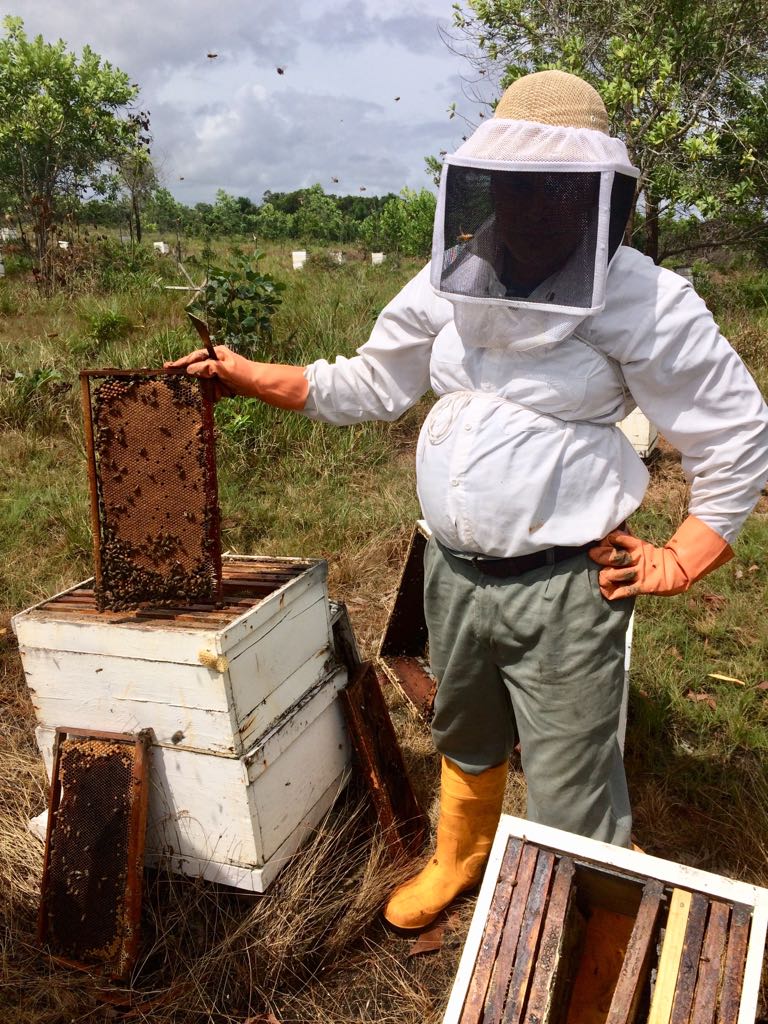
Daily tasks at the apiaries vary from day to day and in-season (flowering) to off-season, ranging from hive inspection to maintenance, to collecting honey. Working with bees necessitates wearing protective gear including a beekeeping hat equipped with a face net, a protective beekeeping suit, and gloves, to shield the beekeeper from being stung. During the flowering season, honey is collected. Hives are smoked, bees brushed off the combs, and frames with honey are chosen and placed in boxes. These are then taken to the factory at Mon Choise Village for honey extraction. After uncapping the combs, they are placed into the extractor and the honey is spun out. Buckets at the base of the extractor collect the honey, which is then strained into containers. Bottling, labeling (in 1000 ml, 500 ml, and 200 ml bottles) and marketing follow. The local market can easily absorb current national production. Prudent management necessitates the prompt return of the frames to the hives the next day to stop the bees from building new combs. At Fort Wellington, this cycle is repeated 15 days later while at Laluni it is a 6 to 8-week cycle.
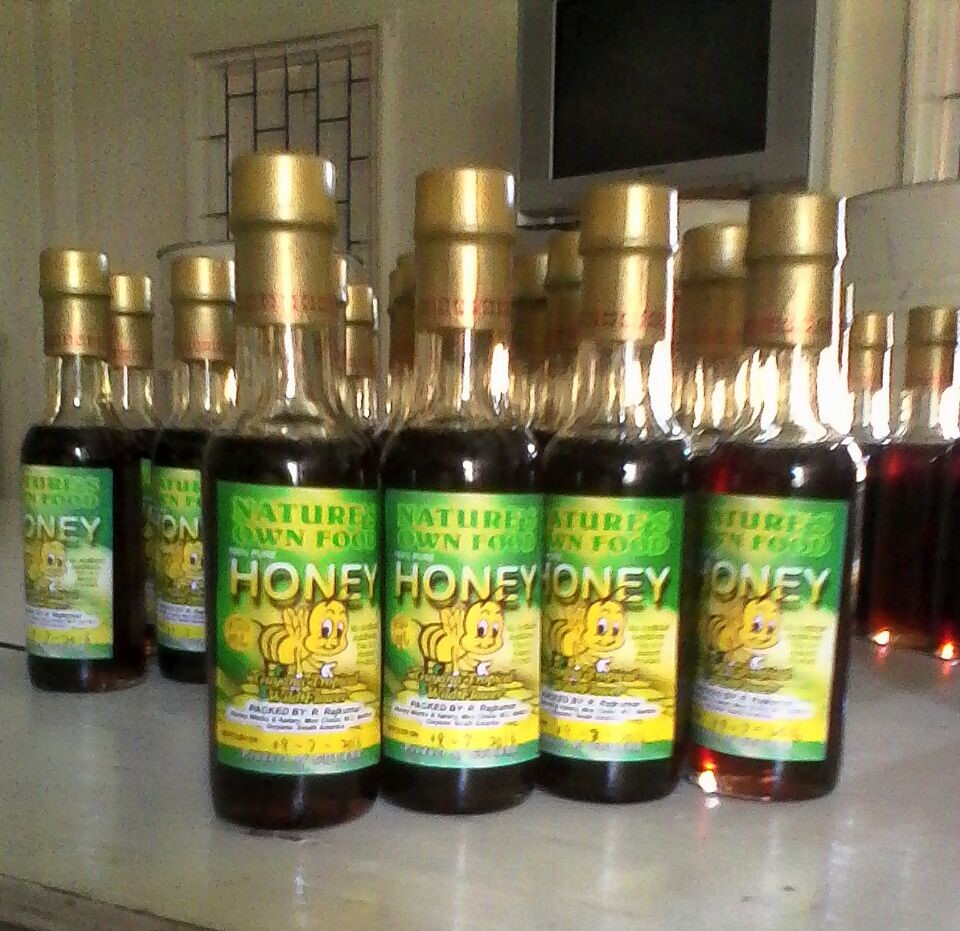
Beekeeping Africanized Honeybees
In 1956, to improve the honeybee genetic stock, the African honeybee, Apis mellifera scutellata, was introduced into Brazil. Some bees escaped from captivity and hybridized with local (European) honeybee populations – the result was the Africanized honeybee. This bee spread quickly over the South American continent, eliminating existing honeybee populations because they were aggressive, exploited available resources better, and had greater reproductive capacity and gene flow. The Africanized bees arrived in Lethem, Guyana in 1975 and reached the coastland in 1976.
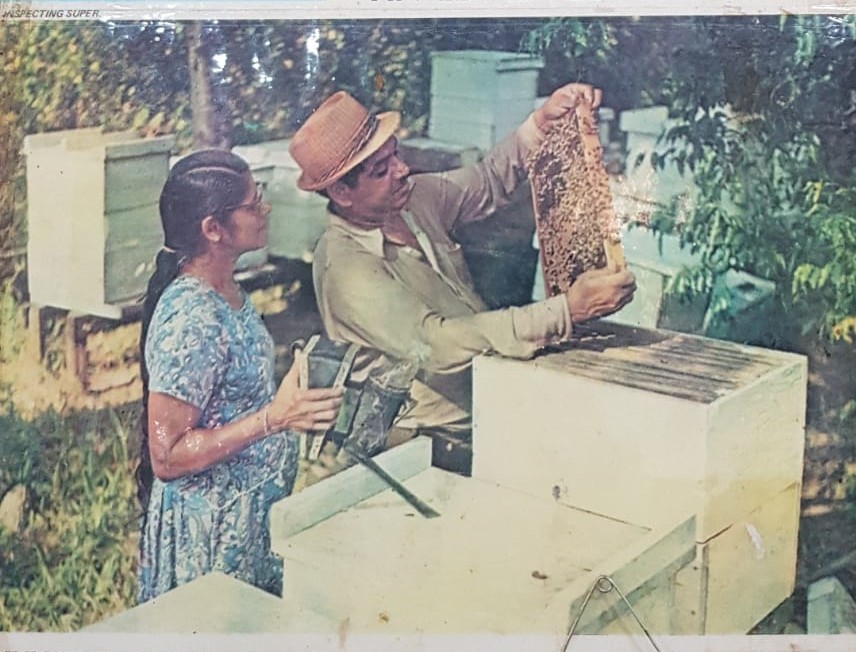
Africanized honeybees have greater hive productivity than European bees. They are also more aggressive attacking people, livestock, and pets when disturbed. According to Ravi Rajkumar, Africanized bee hives should be located some distance (1500 feet) away from the housing areas. He also advocates that “sight-barrier trees” should be “planted” to deny the honeybees from seeing and being attracted to lights at night as this encourages nesting in buildings ceilings and roofs. Further, he advises that hives should be regularly inspected to identify signs of swarming, or other issues that could trigger defensive behavior. If signs of swarming are identified, prompt action is advocated, such as adding supers (additional boxes placed on top of the existing hive), – a customary practice in response to overcrowding.
Challenges & Vision
Climate change has imposed unique challenges to beekeeping, with for example unseasonal rains or conversely, extended periods of drought impacting the flowering season. Reduced availability of nectar and pollen means less feed for honey production. Supplementing the hive with sugar solution is prudent to prevent the absconding or swarming of the bees. This presents a challenge as sugar prices have increased. Management of these stressed honeybees comes with increased production costs.
Mr. Rajkumar is hopeful that the Guyana Livestock Development Authority (GLDA) will initiate a breeding program to eliminate the Africanized bees’ vigorous nest defense but maintain their productive characteristics. He feels this should be accomplished via artificial insemination to keep costs down while optimizing the semen use on as many queen bees as possible.
He looks forward to more persons entering beekeeping, though he cautions that they start with few hives. He encourages these entrants to join the Guyana Apiculture Society to learn from fellow peers’ experiences. He feels that they should read and train themselves, gaining practical experience for at least three years before scaling up to fifty or more hives for potential commercial success.
In Closing…
Success in beekeeping depends on the availability of sufficient bee forage flora in terms of both quality and quantity of nectar and pollen grains. Management skills and experience are critical, given the unique “challenge” of Africanized bees in Guyana. The challenges of climate change and increased production costs must also be recognized. Current productivity levels at Nature’s Own Food Honey have fallen compared to the years gone by. Mr. Rajkumar nonetheless has confidence in consumer acceptance of his product and expects greater honey production in the coming years. The GSA Alumni Association proudly names Mr. Ravi Rajkumar as Alumnus of the Month.
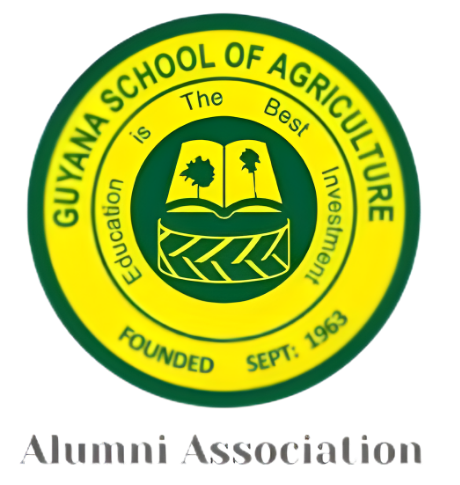
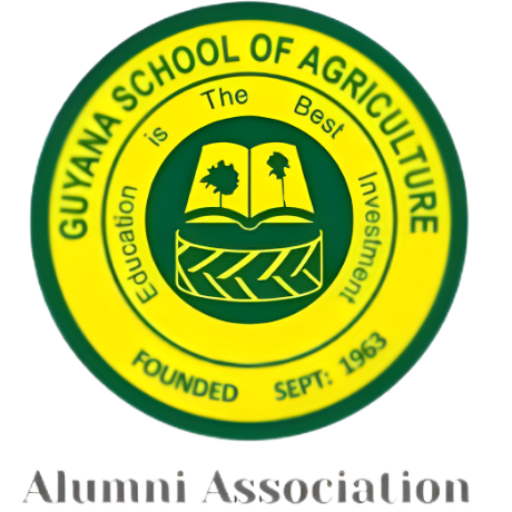




Kelvin Craig
Congratulations to you Ravi. I recall Ravi as a student of mine at GSA and even in his early post-GSA years working along with his father who I had gotten to know. To have a family business grow and expand across several generations is a significant accomplishment. GSA would have given Ravi additional general technical knowledge about agriculture but would also have given him a foundation in accounts, marketing, economics and confidence to represent his business interests. While most Alumni enter the job market, Ravi is one of several entrepreneurs with a GSA background. Would be nice to hear of others.
Ravi Rajkumar
I want to say Thank you for nominating me as alumnus of the month, and thank you to everyone that was involved in compiling the above article. a very big thank you.